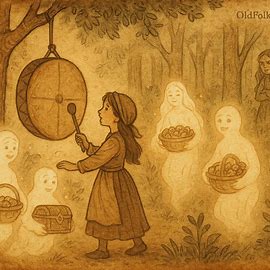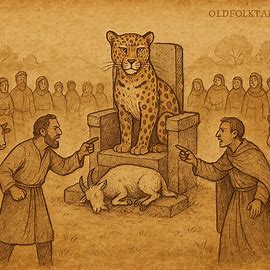Long ago, in the lush villages of Equatorial Guinea, two neighbors lived apart yet knew each other well: Yongolokodi the Chameleon and Nja the Leopard. Each had his own home, his own way of living, and his own wealth. The Leopard was swift, proud, and feared by many; the Chameleon was slow, patient, and often overlooked. But though their bodies were different, fate would bind them together in a test of fairness, patience, and justice.
The Chameleon was not without wealth, for he tended carefully to a herd of goats and sheep. He lived quietly, moving at his own unhurried pace, watching over his animals with care. One day, the Leopard came to his village. The Leopard, tall and majestic, with spotted fur gleaming like shadows among the leaves, admired the herd that filled the Chameleon’s pens.
“Chum!” Leopard called warmly, “lend me some sheep, that I may raise them on shares.”
The Chameleon welcomed him with food, for in his heart he was hospitable and generous. After they ate, he replied, “You may send your children tomorrow to take the herd of sheep and goats on shares.”
“Very good,” Leopard said, rising to return home.
When he reached his village, Leopard told his wife with satisfaction, “My friend Yongolokodi treated me with the greatest kindness. He even gave me sheep and goats to raise on shares.”
The very next day, Leopard’s children came to the Chameleon’s village and drove away a large herd of goats and sheep. Time passed, and the animals multiplied in Leopard’s care until his entire village was overflowing with their bleating and trampling.
Three years went by. The Chameleon, moving in his slow, deliberate way, thought to himself, “By now, surely the herd is large enough for division.” He set out, crawling naka, naka, naka, until at last he reached Leopard’s house.
Leopard welcomed him, ordered food to be prepared, and after they had eaten, the Chameleon said gently, “Chum, I have come so that we may divide the shares of the herd.”
Leopard smiled cunningly and replied, “Good! But today is too hot to catch goats and sheep. Return tomorrow morning.”
“Very good,” said the Chameleon, and he returned to his village.
The next morning, after crawling naka, naka, naka once more, he reached Leopard’s village. Yet during the night, Leopard had opened the pens and scattered the herd outside. With false sorrow, he said, “Alas, chum! Somehow the pens were opened, and the animals escaped. Go back, and return on the second day, for tomorrow I must travel to the swamp to cut bamboo.”
“Very good,” said Chameleon, turning back again.
Day after day, the same excuses followed. Each time the Chameleon journeyed slowly, patiently, naka, naka, Leopard deceived him, hoping the little creature would give up or die along the way. In his heart, Leopard thought, “This fellow will never endure such endless journeys.”
But Chameleon endured.
One evening, as Leopard and his wife lay resting, she asked him, “Why do you delay the division with Yongolokodi? Do you think his slowness will kill him?”
Leopard sighed. “No, wife. It is not weakness that slows him, but the way Njambe, the Creator, made him. His walk is his walk.”
Still, Leopard schemed. But the Chameleon, though small and patient, was not blind. One night, he crept quietly to Leopard’s house and waited outside.
At dawn, when Leopard emerged, there was the Chameleon, sitting on the very threshold of his hut. Leopard started in surprise, unable to offer another excuse, for the goats and sheep were still penned inside. He called his children at once and commanded, “Tie the goats and sheep with cords!”
So they tied them, and Leopard and Chameleon divided the herd fairly at last. One went back to his village, and the other returned to his own, each with his share.
Moral Lesson
This Equatorial Guinean folktale teaches that no one, however small or slow, should be despised or cheated. Patience and persistence are greater weapons than speed and cunning. The Chameleon, though mocked for his slowness, proved stronger than Leopard’s tricks because he refused to give up.
True justice may be delayed, but it cannot be denied. Those who impose on the weak, believing them powerless, will in the end be forced to reckon with truth and fairness. Strength lies not in size or swiftness but in endurance, patience, and quiet determination.
Knowledge Check
Who are the two main characters in the folktale?
Yongolokodi the Chameleon and Nja the Leopard.
What wealth did the Chameleon possess that Leopard desired?
A herd of sheep and goats.
Why did Leopard keep delaying the division of the herd?
He hoped Chameleon’s slowness would cause him to give up or die.
How did the Chameleon finally outwit Leopard’s excuses?
He waited outside Leopard’s house at dawn, catching him unprepared.
What lesson does the story teach about the weak or small?
That they should not be despised, for patience and persistence are strengths.
What is the cultural origin of the folktale?
It is an Equatorial Guinean folktale.
Source: Equatorial Guinean folktale






